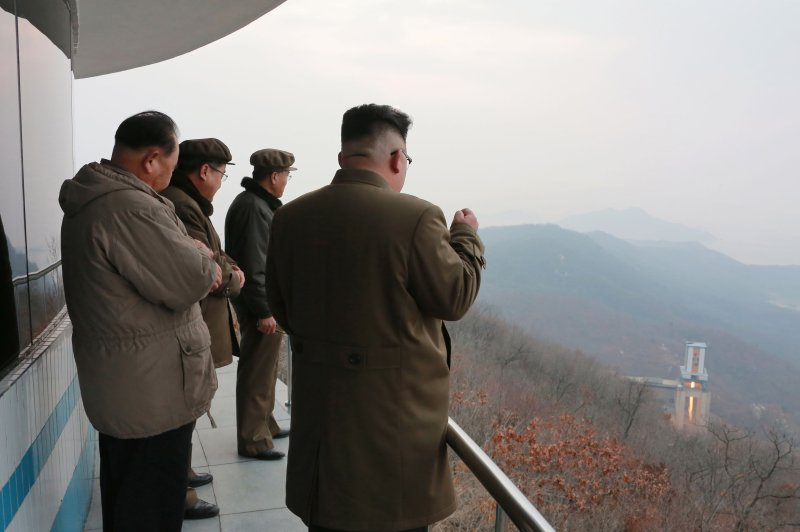A photograph released on March 19, 2017, shows Kim Jong Un watching a high-thrust rocket engine test. North Korea has stopped dismantlement at Sohae Satellite Launching Station in August, according to U.S. analysts. File Photo by KCNA/EPA
Nov. 9 (UPI) -- North Korea activity has not stopped at Sohae Satellite Launching Station, where the regime sent a long-range rocket into space in 2016.
Commercial satellite imagery from Oct. 31 analyzed on 38 North indicates Pyongyang has been installing new equipment and no additional dismantlement has taken place since Aug. 3, according to analysts Jack Liu, Peter Makowsky and Irv Buck.
The equipment could be used for ventilation on one of the storage bunker roofs, analysts say.
"While the new equipment seems to have been installed between June and July 2018, previous imagery until late October had insufficient detail to distinguish between partial roof demolition and new equipment installation," they say.
Vehicles may also have been moving in and out of the site.
The renewed activity is a cause of concern for analysts who have said it is likely North Korea is developing nuclear weapons while seeking sanctions relief.
The regime has previously violated international rules on nuclear proliferation, and it continues to breach banks around the world to steal money from ATMs.
Cybersecurity firm Symantec said Thursday Pyongyang's hackers stole tens of millions of dollars in the last two years through breaches of bank ATM servers in Asia and Africa.
North Korea used malware, dubbed FASTCash, to infiltrate small to medium-sized banks. The virus intercepts cash withdrawal requests and programs ATM machines to make unauthorized withdrawals, News 1 reported.
The U.S. Computer Emergency Readiness Team under the Department of Homeland Security said in October cash was withdrawn in this manner in 30 countries in 2017, and similar theft occurred in 23 countries in 2018.
The Lazarus Group, composed of hackers with likely links to North Korea, has considerable knowledge and expertise of security vulnerabilities among banks, Symantec said.















